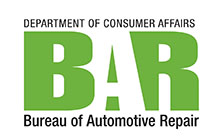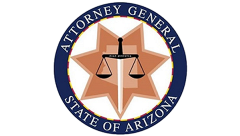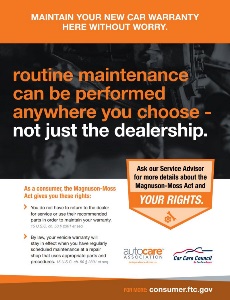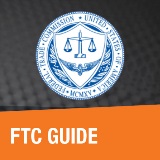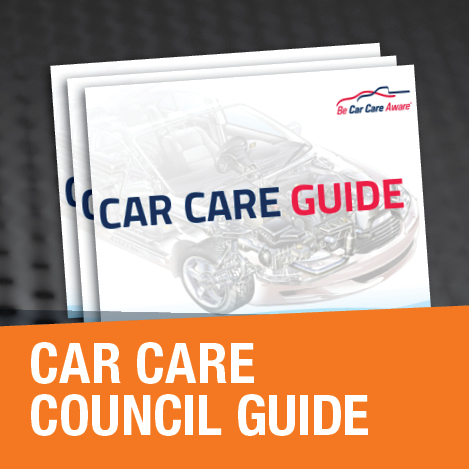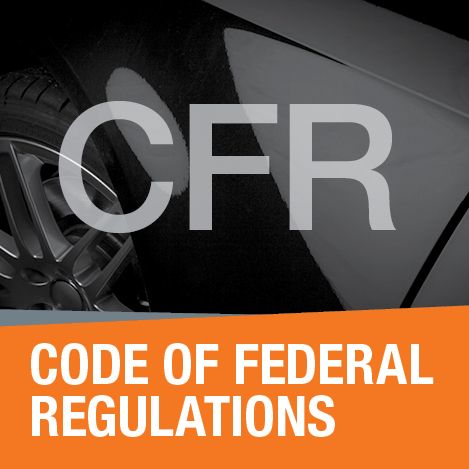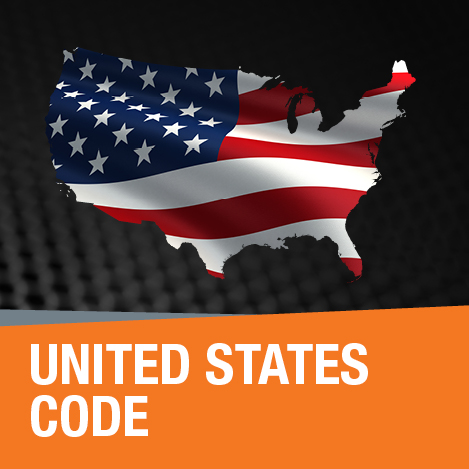Glossary Red Flag Checklist What is the Law Warranty Maintenance Get Involved
Aftermarket Parts: Aftermarket parts are designed similarly to Original Equipment Manufacturer (OEM) parts and may meet the requirements; however, they may not be the exact measurements.
As-Is Vehicle Purchase: With
an as-is purchase, once you leave the dealership, all repairs and maintenance are the owner’s financial responsibility. There is no warranty to assist with the cost of repairs.
Automobile Insurance Policy: An automobile insurance policy is a contract between you and the insurance company. Insurance coverage helps to repair your vehicle if it’s damaged by a specific cause such as an accident, theft, etc.
Automobile Insurance Warranty/Automobile Extended Warranty/Motor Vehicle Service Agreement/Auto Service Contract: A contract between you and the insurance company. This warranty helps cover repairs to your vehicle if damaged by specific causes of loss such as mechanical failures. The warranty usually goes into effect after the manufacturer/dealer warranty
expires.
Manufacturer/Dealer Warranty (New Vehicle Warranty): A warranty is a contract between the manufacturer/dealer and the buyer. It covers certain mechanical breakdowns, and the parts and labor repair costs.
Original Equipment Manufacturer (OEM) Parts: OEM parts are designed at specific measurements to meet the original engineering design.
Routine Maintenance: Routine maintenance is required to ensure
your vehicle maintains its effectiveness. Routine maintenance includes services such as oil changes, belt changes, tire rotations, etc.
Routine Maintenance Schedule: A schedule outlined by the manufacturer in which
specific repairs or maintenance should be completed to maintain the vehicle’s effectiveness.
Know what to look for to determine if you are being misled about your vehicle warranty. As a warrantee, you should receive a clear, easy-to-understand warranty that includes who and what is covered; an explanation of the warrantor’s and
your responsibilities, including where you may have your vehicle serviced; the expiration date; and ways to handle disputes with the warrantor. If you have questions about your vehicle warranty, contact the warrantor or dealership/manufacturer.
RED FLAGS
The warranty is difficult to read and comprehend, and you are unsure of the specific terms that are outlined. You are unsure what is covered by the warranty.
A representative insists that you service your vehicle at the dealership to keep your warranty intact.
A representative is aggressive and refuses to release your vehicle if you do not have your vehicle serviced at the dealership.
A representative explains that you must use original equipment manufacturer (OEM) parts when having your vehicle repaired to keep your warranty intact, or the dealer voids the warranty for using aftermarket parts.
A dealer refuses your warranty coverage because you obtain services at another repair shop.
A dealer will not put repair terms and costs in writing.
Download the Red Flags Checklist
WHAT THE ACT REQUIRES
The Magnuson-Moss Warranty Act is a consumer protection law enforced by the Federal Trade Commission. The Federal Act requires warranties to be written in clear and easy-to-understand language and terms. The Act requires that a written warranty
include:
- Who is covered by the warranty.
- A clear description and identity of what is covered.
- Responsibilities of the warrantor and the consumer, including where and how repairs and maintenance can be performed.
- Warranty expiration.
- Ways to handle disputes with the warrantor.
Please note, the Magnuson-Moss Warranty Act does not require a business to provide a written warranty.
If a business decides to offer a written warranty on a consumer product, it must comply with the Act.
WHAT THE ACT PROHIBITS
There are three prohibitions under the Magnuson-Moss Warranty Act:
- Disclaimer or Modification of Implied Warranties
- “Tie-in Sales” Provisions
- Deceptive or Misleading Warranty Terms
Disclaimer or Modification of Implied Warranties | Implied warranties are unspoken, unwritten promises from a seller/merchant/warrantor to a customer. Implied warranties are the warrantor’s promise that the products/ goods
sold will function in the way intended and that there is nothing significantly wrong with them. It is also a promise that the product can be used for a specific purpose. The Act prohibits anyone who offers a written warranty from disclaiming
or modifying implied warranties. So, if the product does not work as intended or is not fit for a specific purpose, the warrantor must remedy the problem or the warranty is breached.
“Tie-In Sales” Provisions | Provisions that state or imply that a consumer must buy or use an item or service from a particular company to keep the warranty coverage, such as being required to use original equipment
manufacturer (OEM) parts.
Deceptive Warranty Terms | Warranties must not contain deceptive or misleading terms. A warranty cannot appear to provide coverage when it actually doesn’t. Additionally, a warranty cannot promise a service that the warrantor
had no intention of providing or could not provide. These are examples of deceptive warranty terms.
Download What is the Law PDF
Share these tips to maintain your warranty with your end users and consumers:
- Read your warranty and ensure you understand the terms and coverage, including the warranty period.
- Speak with the warrantor or dealership to obtain clarification on the warranty.
- Know the law - Magnuson-Moss Warranty Act - and how it impacts you.
- Be sure to follow the routine maintenance schedule and ensure all repairs are completed timely.
- Record all maintenance and repairs that are completed on your vehicle and save the receipts for the service.
- Ensure the receipts are clearly dated and list an accurate description of the parts supplied and service performed.
- Ensure the dealership or repair shop is licensed or certified (registered) with the state.
- File a warranty claim only when necessary. The vehicle manufacturer or dealer has the responsibility to demonstrate that the use of a non-OEM part or service caused the failure in question.
Share your story
Has a consumer turned down service at your shop because a manufacturer threatened that their warranty was voided?
Has a customer not returned to have service because they believe their warranty will be voided if their vehicle isn’t
serviced at the dealer?
Has a customer asked for a refund for service performed because they were told they could they could only have their service performed at the dealer?
Do you have any owners manuals, press releases,
or inserts from a manufacturer that state that vehicles must be serviced at the dealership to avoid voiding the warranty?
We are looking for stories and documentation of MMWA violations so that the Auto Care Association can stand
up for your rights.
Speak up on social
Note to members: The content below are only suggestions for your organization and employees to consider using on their respective social media accounts to help increase reach and visibility regarding the Magnuson-Moss Warranty Act.
Sample Facebook Posts:
The Magnuson-Moss Warranty Act prohibits product manufacturers from conditioning consumer warranties on the use of any original equipment part or service. In the case of motor vehicles, new car
manufacturers have ignored these conditions outlined in Magnuson-Moss and have misled consumers to believe that they must have dealer service shops install only original equipment replacement parts or fear having their new car warranty voided.
Get educated today: autocare.org/mmwa #MagnusonMoss
Did You Know? It’s a common misconception that only car dealers can perform the routine maintenance and repairs on a newer vehicle that is under warranty. In fact, it is law that consumers can patronize their neighborhood repair shop or
do the work themselves without violating the manufacturer’s warranty: autocare.org/mmwa.
Has a manufacturer threatened to void your warranty, if your vehicle was not serviced
at the dealer? We want to hear from you! Share your story below in the comments! #MagnusonMoss
Sample Twitter Posts:
True or False? You must service your vehicle at the dealer, to maintain its warranty.
FALSE! Federal Law protects your right to choose between an Independent Shop, or a Dealership. Learn
your rights today: autocare.org/mmwa #MagnusonMoss
Oil changes, tire rotations, and brake pads: What do they all have in common?
They’re all covered under the Magnuson-Moss Warranty Act, with the use of aftermarket parts! Learn more about your right to choose today:
autocare.org/mmwa #MagnusonMoss
Sample LinkedIn Posts:
Have you ever been told that only your local dealer can perform the routine maintenance and repairs on a newer vehicle that is under warranty? The Magnuson-Moss Warranty Act has made it illegal
for a dealer to deny your warranty coverage, if someone else performs your maintenance. Learn more on how to stand up for your vehicle owner rights at: autocare.org/mmwa #MagnusonMoss
It’s a common misconception that only car dealers can perform the routine maintenance and repairs on a newer vehicle that is under warranty. The truth is that consumers can have routine repairs performed by their local independent repair
shop or do the work themselves without affecting the warranty. Know your right to choose, learn more today: autocare.org/mmwa #MagnusonMoss



